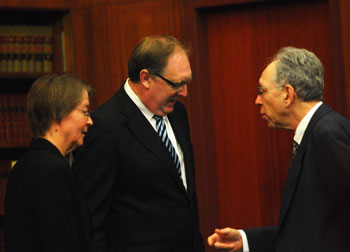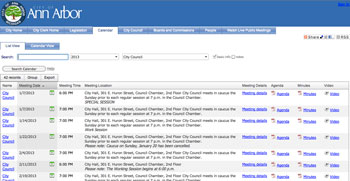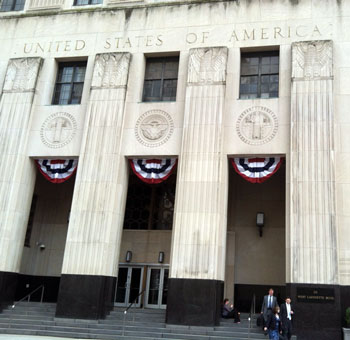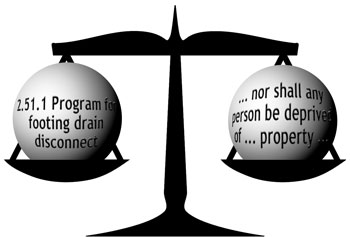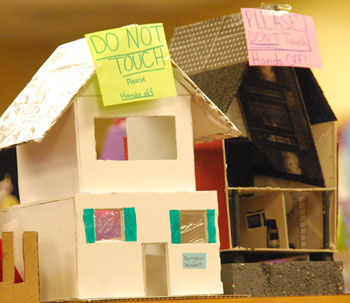Editor’s note: This “Live Updates” coverage of the Ann Arbor city council’s June 2, 2014 meeting includes all the material from an earlier preview article published last week. The intent is to facilitate easier navigation from the live updates section to background material already in this file.
The council’s first meeting after adopting the budget for fiscal year 2015 – which was approved on May 19, 2014 – features a housekeeping adjustment for the current year’s budget, so that expenditures don’t exceed allocations.
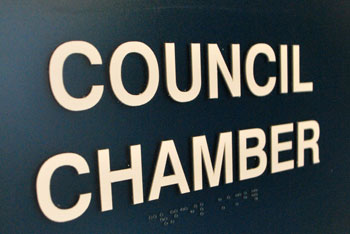
The sign on the door to the Ann Arbor city council chamber includes Braille.
But the June 2 meeting agenda is dominated by items related to the physical attributes and layout of the city. Several items deal with city-owned physical assets, while several more involve land use and planning.
Possibly one of the more controversial agenda items related to physical infrastructure – and future development in the city – is a contract extension with CDM Smith Inc. for work related to the city’s footing drain disconnection (FDD) program. While the city council suspended the program in certain areas of the city in 2012, it continued in other areas, backed by the city’s ordinance under which the city can require residents to disconnect their footing drains from the sanitary sewer system.
Also not suspended was the city’s developer offset mitigation program, which requires developers to offset the increased flow from new construction into the sanitary sewer system. The vote on the CDM Smith Inc. contract extension was postponed from the council’s May 5 meeting. The dollar amount of the contract extension has been substantially reduced in the meantime – from about $750,000 to $143,000.
Part of the backdrop of the CDM Smith contract extension is a lawsuit that’s been filed against the city, challenging the legal foundation of the footing drain disconnect ordinance. The city sought to remove the case from state court to the federal system, but at a hearing on the matter this week, a federal judge indicated he’d be remanding the case back to the Washtenaw County 22nd circuit court.
City assets on the June 2 agenda include trees – as the council will be asked to approve the city’s urban and community forest management plan. The council will also consider a resolution on the city’s possibly most recognizable asset – the city hall building. The resolution would remove a $4 million renovation of city hall (a “reskinning”) from the city’s capital improvements plan for 2017 and 2018. This resolution was postponed from the council’s May 19 meeting.
Another city-owned asset on the agenda is the Library Lane underground parking garage. The council has already directed the city administrator to engage a real estate broker to test the market for the development rights for the surface of the garage. The resolution on the June 2 agenda, which was postponed at the council’s April 7 meeting, would set a policy to deposit 50% of the net proceeds from the sale of the development rights into the city’s affordable housing trust fund.
Land use and planning items on the June 2 agenda include a roughly $300,000 contract for study of the State Street transportation corridor. Related to transportation infrastructure, the council will also be asked to approve resolutions that move along the process of special assessing property owners on Stone School Road for the cost of installing a sidewalk on the west side of the road in connection with a road reconstruction project.
Also related to land use, three Ann Arbor housing commission properties will be given initial consideration for rezoning. A site plan and associated rezoning for the Delta Gamma house will be given final consideration. Also up for final consideration is a revision to the ordinance regulating drive-thrus. Councilmembers will also consider the site plan for a new Ruth’s Chris restaurant to be located downtown on South Fourth Avenue.
A rate increase for Ann Arbor water, sewer and stormwater rates is on the June 2 agenda for final approval.
Two items connected to parks and recreation appear on the agenda. One is approval of the receipt of funding for a program that helps Bridge cardholders purchase local produce at the farmers market. The second item is approval of a five-year agreement with the Community Action Network to continue operating the city’s Northside and Bryant community centers.
The council will also be considering a resolution in support of the local development finance authority’s application to the Michigan Economic Development Corp. for a possible 15-year extension of the arrangement under which the LDFA captures taxes. The captured taxes are used to fund a business accelerator that’s operated by Ann Arbor SPARK through a contract with the LDFA. Without an extension, the LDFA would end in 2018.
This article includes a more detailed preview of many of these agenda items. More details on other agenda items are available on the city’s online Legistar system. The meeting proceedings can be followed Monday evening live on Channel 16, streamed online by Community Television Network starting at 7 p.m.
The Chronicle will be filing live updates from city council chambers during the meeting, published in this article below the preview material. Click here to skip the preview section and go directly to the live updates. The meeting is scheduled to start at 7 p.m. at city hall, 301 E. Huron. [Full Story]
